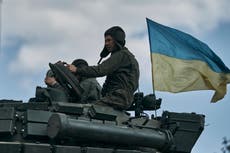Wagner chief ‘offered to give up locations of Russian soldiers’ to Ukraine, leaked papers say
Extraordinary offer to trade control of Bakhmut for war secrets was rejected by Ukraine, reports say
The head of Russia’s Wagner mercenary force, Yevgeny Prigozhin, offered to reveal the positions of Vladimir Putin’s forces to Ukraine, leaked US intelligence documents show.
The extraordinary offer – which was rejected by Ukraine – was made in January by the Wagner chief as part of a proposed quid pro quo deal with Kyiv, reported the Washington Post.
The Wagner chief offered to leak information on the positions held by Russian troops if Ukraine’s commanders withdrew their own soldiers from the area around the fortress city of Bakhmut, handing Prigozhin a victory there in exchange for the opportunity to accurately target Russian positions elsewhere along the frontline.
Prigozhin’s offer was made via his contacts in Ukraine’s intelligence service, according to the reported documents. The leaks did not detail which Russian positions the Wagner chief was offering to disclose to Ukraine.
Prigozhin, a close ally of Russian president Vladimir Putin, has repeatedly threatened publicly to withdraw his mercenaries from the area around Bakhmut, where they are at the vanguard of the Russian offensive, as he sought more ammunition from Moscow.
Dismissing the reports on Monday, Prigozhin called the allegations “nonsense” and blamed them on unnamed residents of Moscow’s plush Rublyovka suburb – a byword for Russia’s business and political elites – in an audio recording released on Telegram.
The reports were also rejected by the Kremlin as “looking like a hoax”.
The White House has declined to issue a comment on the matter.
The Washington Post report cited two unnamed Ukrainian officials as saying Prigozhin has reached out to the Ukrainian intelligence directorate, known as HUR, several times during the course of the war.
One of the officials added that Prigozhin extended the offer on Bakhmut more than once, but Kyiv repeatedly rejected it due to a lack of trust in the Russian leaders, with the proposals considered to be disingenuous.
Kyiv’s doubts over the reported proposals were also shared by Washington, according to source in the US and Ukraine cited in the report.
Prigozhin’s constant criticism has sparked a wave of concern within the Russian defence ministry, as they have been privately wondering how to respond to Putin’s ally on issues including the military’s performance and his demands for more resources, other leaked documents show.
The Russian defence ministry has conceded that Prigozhin’s grievances are not illegitimate.
These documents hint at a power struggle between Prigozhin and top Russian officials, including defence minister Sergei Shoigu. Earlier this month, Prigozhin directly abused Mr Shoigu and Russian chief of staff Valery Gerasimov after losing more than 30 soldiers in a day.
One document shows that the Wagner head leaked information on the Russian military’s struggles with ammunition supplies to a Ukrainian intelligence officer.
In response to the Post’s report, the Wagner chief denied meeting Kyrylo Budanov, the head of Ukrainian military intelligence, in an unnamed African country, saying he had not been in the continent since the start of the Ukraine conflict and portraying the idea of a phone call with him as laughable.
Prigozhin also advised the Ukrainian forces to go ahead with an assault on the Crimean border at a time when morale among Russian troops was low.
The intelligence also points to Prigozhin’s awareness of plummeting morale among his own Wagner forces, the report added. Some of Prigozhin’s fighters were said to have baulked at orders to deploy in the Bakhmut area under heavy fire for fear of suffering more casualties, the Post reported.
Bakhmut has been the epicentre of the bloodiest ground combat in Europe since the Second World War, with the battle of attrition over the salt mining town being waged for nearly 10 months now.
Join our commenting forum
Join thought-provoking conversations, follow other Independent readers and see their replies
Comments




Bookmark popover
Removed from bookmarks